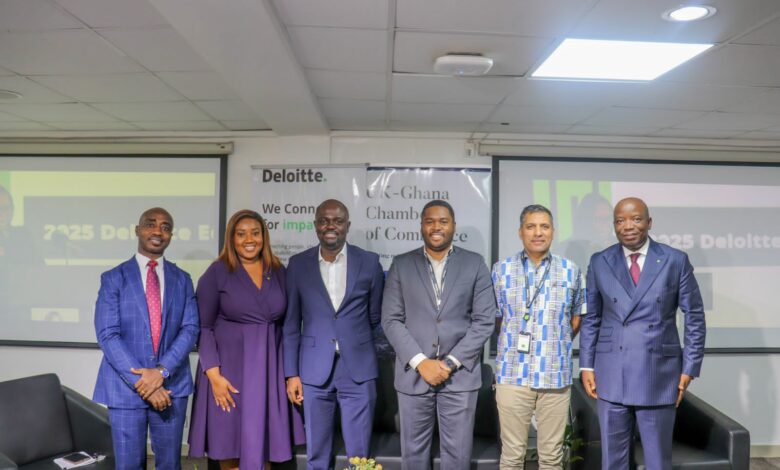Investment experts urge Ghanaian start-ups to prioritise the sustainability of their businesses over fundraising

A panel of investment experts comprising Barri Youri, Senior Manager, Financial Advisory at professional service advisory firm, Deloitte Ghana; Saqib Nazir, Chief Executive Officer of Mojo Payments and David Tetteh, Senior Consultant at the Ghana Investment Support Programme (GHISP), have urged start-ups and small and medium-sized enterprises (SMEs) seeking to raise funds, to rather prioritise developing the fundamental aspects of building a viable and scalable business.
According to the experts, this is because securing funding does not always equate to immediate business success.
Speaking during a UK-Ghana Chamber of Commerce (UKGCC) and Deloitte Ghana webinar on ‘Demystifying Investor Expectations: What you need to know before seeking capital’, Mr. Yourri remarked, “What happens is a lot of entrepreneurs focus on the capital raised at the expense of developing and sustaining the fundamentals of the businesses. Securing funding is good for all businesses but it is a means to an end, which is scaling up the business. Therefore, you need to have a mindset that it is part of the journey, not the destination”.
“If you keep focusing on raising capital instead of how to scale the business and make it more profitable, eventually, the business will fail”, he added.
According to Mr. Yourri, these business fundamentals that need to be prioritised over fundraising include ensuring diversity in products and services, alignment with the United Nation’s Sustainable Development Goals, ensuring the business has a social impact, and ensuring good and robust financials.
In addition to these, Saqib Nazir highlighted the importance of the character of the businesses’ management team and commitment to building trust, while David Tetteh emphasised a focus on responsible business practices such as regulatory compliance and an unsullied reputation.
“While a business’s ability to turn a profit is the last thing investors look out for when assessing a start-up, the truth is that if you have all these things in place, the likelihood that you would be able to execute a business plan and return investment is much higher”, Mr. Tetteh shared.
Dismantling common fund-raising myths
The panel dispelled common fundraising myths, including the misconception that a groundbreaking idea alone will naturally attract funding and justify a high valuation; that venture capitalists are solely motivated by the potential for high financial returns; and that to successfully raise capital, a business must convince every potential investor.
As investors have specific industries they invest in, this belief can lead to wasted time and energy pursuing investors whose criteria or investment thesis do not align with the start-up’s profile.
Barri Youri strongly urged start-ups to know investors’ investment criteria and requirements and focus on the ones who invest in relevant spaces.
“It’s something that is key because a lot of people think investors will invest in all industries and that is the farthest thing from the truth.
It is, therefore, important to consider a potential investor’s objective which usually includes a timeline for how long they will want to invest in a business; know their focus areas; and what they are passionate about. This helps to interact with them on a human level, especially those interested in the social impact of their investment”, he stressed
Accessing funding and handling rejection
For start-ups and SMEs seeking funding, Saqib Nazir asserted that they must first assess if they are an established business with recurring revenue or at the ideation stage.
Businesses at the ideation stage, according to David Tetteh, may seek funding from acquaintances in their network such as family and friends for initial traction.
“Don’t go to a bank or a big private equity firm if you only have an idea. Start from the people you know. They are the ones who will initially back you, then go to a bank, private equity, or accelerator for the next step”.
The panel concurred that raising funds in Africa is especially challenging. Saqib Nazir advised SMEs and start-ups to be realistic about their expectations and take time to acquire work experience and learn lessons before venturing out to seek capital from lending institutions.
However, businesses must be prepared to face rejection. David Tetteh encouraged businesses to not give up when investors reject them.
“If you get rejected by one investor, it doesn’t mean that the business ends. You may want to ask why you were rejected and work on closing the gaps. You keep at it and as an entrepreneur, you need a lot of grit, especially in our part of the world. You don’t give up because you’ve been rejected but you keep on”.
Mr. Nazir added, “It is a tough fight, but we need more entrepreneurs; we need to grow the eco-system. There are real life problems to solve. We have to solve our problems ourselves and we have to grow our own economies ourselves.
Entrepreneurship: a worthwhile challenge
Barri Youri admitted that while successfully accessing funding for any start-up or SME can be a challenging endeavour, “anything worth wanting is worth the fight. Let’s focus on how we can overcome the challenges. There are a lot of opportunities and funding. It’s just about knowing how to access it and knowing how to reach the investors”.
Finally, David Tetteh urged entrepreneurs to participate in more of such conversations where there are opportunities to talk to investors and advisors.
“The more you interact with them, the more you learn, and the more likely you are to get a recommendation as to where you get funding”.
Samera Tara, Financial Advisory Manager at Deloitte Ghana, moderated the panel discussion, which explored related topics such as deal breakers that might affect closing a deal, the financial and operational imperatives investors look for before investing in a business, and risk assessment amongst others.
In attendance was Deloitte Ghana’s Country Managing Partner, Daniel Nana Owusu, who assured start-ups and SMEs of Deloitte Ghana’s continued commitment to assisting them find the solutions they need to access funding and scale up their businesses.
About the UKGCC
The UK-Ghana Chamber of Commerce (UKGCC) was established in 2016 with the support of the United Kingdom’s Department for Business and Trade (DBT) to promote trade between the United Kingdom and Ghana. It is the leading private sector organisation proffering trade and commerce support for UK and Ghana businesses.
The UKGCC is backed by the British and Ghanaian Governments through the British High Commission in Accra, the British Chambers of Commerce in the United Kingdom and the Ministry of Trade & Industry in Ghana.
The UKGCC is a two-time British Chambers of Commerce (BCC) International Chamber of the Year finalist, and 2023 BCC International Chamber of the Year.





